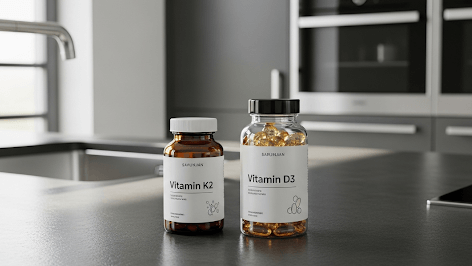
Understanding Vitamin K2: The Nutrient for Heart Health
Vitamin K2, a critical nutrient found in various foods, has gained attention for its role in cardiovascular health. It's present in animal products like beef liver, cheese, and egg yolks, along with fermented foods such as natto and sauerkraut. Two key forms of Vitamin K2 are MK4 and MK7, both of which play an essential role in directing calcium to bones and preventing arterial calcification. While many believe that K2 can effectively remove calcium from arteries, recent studies suggest that it may not directly clear existing plaque but can help slow the progression of arterial calcification over time.
The Benefits of Vitamin K2
Research indicates that Vitamin K2 has beneficial effects beyond just stopping arterial calcification. It has a positive impact on metabolic health by helping manage conditions like prediabetes and insulin resistance, which are often related to heart disease. Improved insulin sensitivity implies that K2 can indirectly support cardiovascular health, making it a valuable component in the diet of those looking to enhance their heart wellness.
Vitamin D3: A Partner in Heart Health
Vitamin D3, also known as cholecalciferol, plays a significant role alongside Vitamin K2. This vitamin, essential for bone health, has also been linked to cardiovascular health. Unfortunately, many people, especially in areas with limited sunlight like Salt Lake City, are deficient in Vitamin D3, impacting their overall health. For heart health, it's generally recommended that individuals aim for Vitamin D levels between 50 to 90 nanograms per milliliter, with a daily dose of 5,000 IU considered safe and effective for many.
Why Separate Supplements?
Combining K2 and D3 into a single supplement might seem convenient, but it can lead to dosage issues. High doses of Vitamin D3 can elevate calcium levels in the blood, potentially harming kidney function over time. It's vital to manage these vitamins separately, allowing you to tailor your intake according to your health needs. Many combination supplements provide insufficient K2 while maintaining high D3 levels, which can be risky for long-term health.
The Safe Way to Supplement
To enjoy the benefits of both vitamins without the risks associated with high doses, consider supplementing K2 and D3 independently. For general health, a daily dose of around 400 micrograms of K2 is often recommended, while osteoporosis management may require higher doses of up to 45 milligrams. Consulting a healthcare professional can help establish the right dosages for your individual health profile and needs.
Incorporating K2 and D3 into Your Diet
Salt Lake City residents looking to enhance their wellness can naturally obtain K2 and D3 from their diet. Foods rich in Vitamin K2 include fermented options like kimchi and natto, whereas Vitamin D3 can be found in fatty fish like salmon, egg yolks, and fortified foods. Making mindful dietary choices and incorporating these vitamins through whole foods can be an effective way to stop inflammation and improve overall health.
Actionable Steps for a Healthier Heart
As you consider integrating Vitamin K2 and D3 into your routine, prioritize whole, nutrient-dense foods. Adjusting your diet can be a proactive step toward better heart health. If you decide to supplement, do so with caution and after consulting your healthcare provider to personalize your approach. Remember, managing your vitamin intake wisely can lead to a healthier, happier life!
 Add Row
Add Row  Add
Add 




Write A Comment